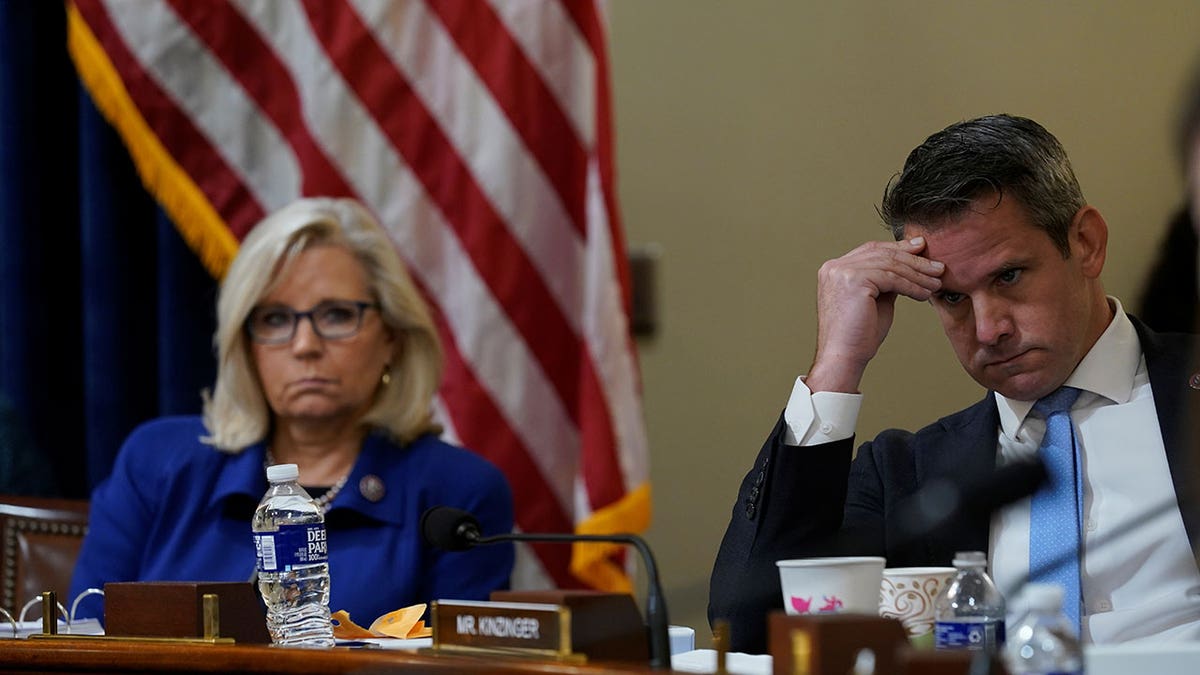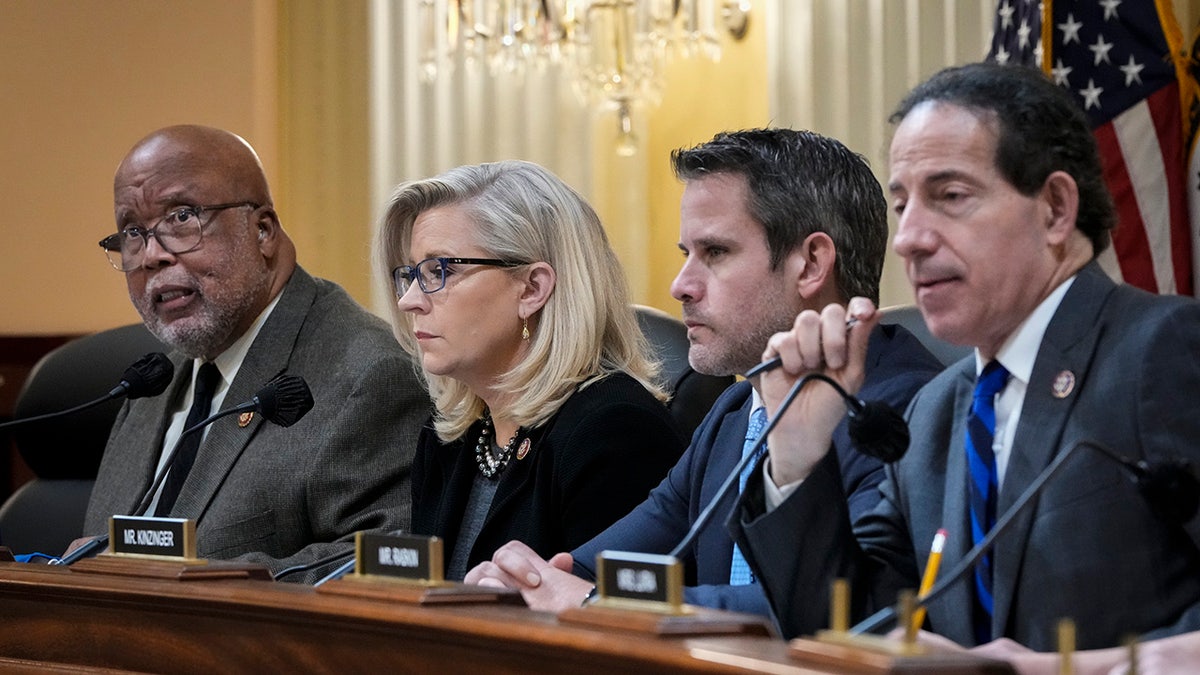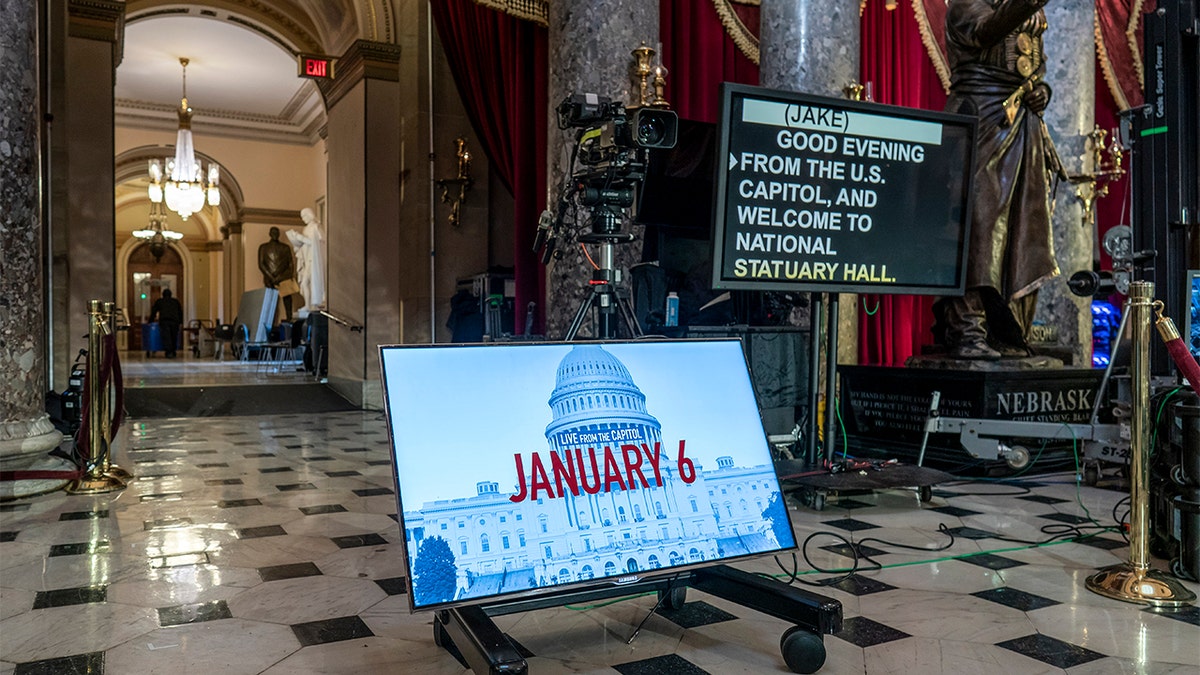Texts about Capitol riot from Trump's inner circle released
Fox News congressional correspondent Chad Pergram discusses text messages allegedly from former White House chief of staff Mark Meadows on ‘Special Report.’
Back in the late 1970s, NBC debuted a new, flashy, expensive, prime-time TV show. NBC envied the success ABC enjoyed with its romantic comedy and cultural icon, "The Love Boat," so it appropriated the hijinks, romance and glamour of an Pacific Ocean cruise. The network ditched the nautical themes like the Lido Deck and ports of call like Puerta Vallarta.
Enter the show "Supertrain."
Everyone piled on board a luxurious, massive, tricked-out, nuclear-fueled, passenger locomotive. Passengers rolled across the country on board a train complete with swimming pools, a disco and a shopping mall.
"Snowpiercer," this wasn’t.
FBI PURGING CONSERVATIVES, CRITICS OF JAN 6 NARRATIVE, WHISTLEBLOWERS TELL GOP LAWMAKER
The elaborate sets were costly. The ratings were anemic. NBC canceled Supertrain after ten episodes. Television historians generally rank Supertrain as one of the most prodigious flops in network history.
The House Committee investigating the Capitol riot has a lot more at stake than the folly of Supertrain. You’ve heard committee members and other Democrats suggest dire warnings that "the future of democracy" is at stake. During an appearance on CBS, House Intelligence Committee Chairman Adam Schiff, D-Calif., — a member of the 1/6 committee — described that fateful day last year as "the first non-peaceful transfer of power in our history."

The Jan. 6 committee, which includes Republicans Liz Cheney and Adam Kingzinger, will air their Thursday hearing during primetime. (Andrew Harnik/Pool via REUTERS)
The riot at the Capitol was one of the most disturbing events in American history: A horde raiding the Capitol as the House and Senate meet in a Joint Session of Congress to certify the presidential election. That’s about as serious as things get. Still, a wide swath of Republicans nationwide and GOPers in Congress support former President Trump. Even after authorities regained control of the building, 147 House and Senate members voted against certifying election results.
At a Senate Judiciary Committee hearing on Tuesday morning, Robert Pape of the University of Chicago laid out the problem facing Democrats heading into Thursday’s hearing.
"Donald Trump is now more powerful because of January 6 than he would have been without January 6," testified Pape.
CENTRIST GROUP NO LABELS TURNS ON JAN. 6 COMMITTEE: 'PARTISAN EXERCISE'
Political observers from both sides are keenly watching to see what impact the 1/6 committee hearings have. It’s unclear if the hearings can move the meter in the court of public opinion as Democrats hope they will.
So, some questions:
Do the hearings reveal seismic revelations which dramatically alter the course of American politics and what we understand about the riot so far? Do the hearings simply confirm what opponents of former President Trump suspected all along? Do Mr. Trump’s loyalists harden their backing of him? Are the hearings preaching to the converted? Does anyone watch? Do Americans care — despite the mayhem which unfolded on Capitol Hill that day and the potential to upend the Electoral College votes?

Rep. Bennie Thompson (D-MS), chair of the select committee investigating the January 6 attack on the Capitol, speaks as Rep. Liz Cheney (R-WY), vice-chair of the select committee investigating the January 6 attack on the Capitol, Rep. Adam Kinzinger (R-IL) and Rep. Jamie Raskin (D-MD) listen during a committee meeting on Capitol Hill on December 1, 2021 in Washington, DC. (Drew Angerer/Getty Images)
The committee has probed the role of the former President and those close to him in the months between election day, 2020, and January 6, 2021. Democrats — and the two GOPers who serve on the panel, Reps. Liz Cheney, R-Wy., and Adam Kinzinger, R-Ill. — hope the hearings will show just how much peril democracy faced that day.
If they’re going to break through to skeptical voters or those still aligned with the former President, the 1/6 committee needs a game changer. This is augmented by the fact that the views of people about the riot break down along party lines.
This is why the committee is exhausting a lot of time and effort on the stagecraft of Thursday’s hearing.
For starters, the committee is holding the hearing in primetime. That’s an effort to command as wide a TV audience as possible. "Evening" Congressional hearings are rare.
Granted, some high-profile hearings always garner lots of coverage. TV networks cleared their schedules for the hearing with former FBI Director James Comey in June, 2017. But that hearing was during the day. The same with the 2013 hearing with former Secretary of State Hillary Clinton on Benghazi. But again, the hearing was during the day. TV networks also went deep into the McCarthy "Red Scare" hearings of the mid-1950s, the Senate Watergate hearings in 1973 and the Iran-Contra hearings in 1987. But none were "scheduled" for primetime.
The confirmation hearings of Supreme Court Justice Clarence Thomas bled into primetime after law professor Anita Hill came forward with allegations of sexual harassment in 1991. Some of the impeachment hearings for former President Clinton also drifted into primetime in 1998. Same with the first impeachment process for former President Trump in late 2019. However, the House Judiciary Committee specifically scheduled one "day-night doubleheader" during the Trump impeachment process. One session during the day. A break. And then the panel came back that evening.
Most confirmation hearings for Supreme Court nominees feature at least one day which bleeds into the evening.
The most recent example of SCHEDULED evening hearings came in 2014. The House Veterans’ Affairs Committee conducted a number of evening hearings in 2014 in an effort to shed light on problems at the VA and the manipulation of records.
The 1/6 panel still wants to hold former President Trump and those around him accountable. But most people have retreated to their partisan camps after the riot. The primetime hearing is an effort to craft a narrative about the riot in a telegenic, media-friendly way which captures the attention of voters.
In order to help with that, the committee signed up former ABC News President James Goldston to help "produce" the hearing.
Many observers (of all political persuasions) applauded the presentations laid out by the House managers in Mr. Trump’s second impeachment trial. What bolstered the case of the House "prosecutors" was the use of videotape from news outlets, Capitol security camera footage and dramatic, frightening transmissions and calls for help from U.S. Capitol Police.

A year after the Jan. 6 attack on the Capitol, television cameras and video monitors fill Statuary Hall in preparation for news coverage, on Capitol Hill in Washington, Wednesday, Jan. 5, 2022. (AP Photo/J. Scott Applewhite)
To be successful, the 1/6 committee needs some sort of breakthrough with the public via these hearings. It’s unclear if that will happen.
The testimony of Special Counsel Robert Mueller before the House Judiciary and Intelligence Committees in July, 2019 was one of the most anticipated Congressional hearings in years. However, Mueller’s testimony was sluggish. Mueller repeatedly told lawmakers that his report "speaks for itself." Or, that the report constituted his "testimony."
The relative lethargy of Mueller’s appearance left Democrats scrambling.
REPORTER'S NOTEBOOK: WITH MUELLER HEARINGS AHEAD, THE 'BOOK' MAY BE BETTER THAN THE 'MOVIE'
At a press conference the day after Mueller’s session, I asked Rep. Eric Swalwell, D-Calif., what did Robert Mueller "fail to do?"
Swalwell argued that Mueller "didn’t fail to do anything."
Yours truly followed up that Democrats were privately frustrated that Mueller "failed to breathe life into that report."
"Well, if you showed up, expecting a Broadway show, sure," replied Swalwell.
And therein lies the rub.

Capitol police officers in riot gear push back demonstrators who try to break a door of the U.S. Capitol on Wednesday, Jan. 6, 2021, in Washington. (AP Photo/Jose Luis Magana)
January 6 was a dark day. But many Americans have moved on. Politically, they’re concerned more about inflation, gas prices and baby formula than the riot. To change the narrative, the committee must re-animate January 6 for the public. Make it a primetime blockbuster. Or, at the very least, a "Broadway show."
"We're not in the business of entertainment," said Rep. Jamie Raskin, D-Md., a member of the 1/6 committee. "We're in the business of trying to communicate to the American people, the gravity and the immensity of these events."
CLICK HERE TO GET THE FOX NEWS APP
The committee may have lot of damning, harrowing information to share.
But it may not matter unless the committee grabs the attention of voters.















































